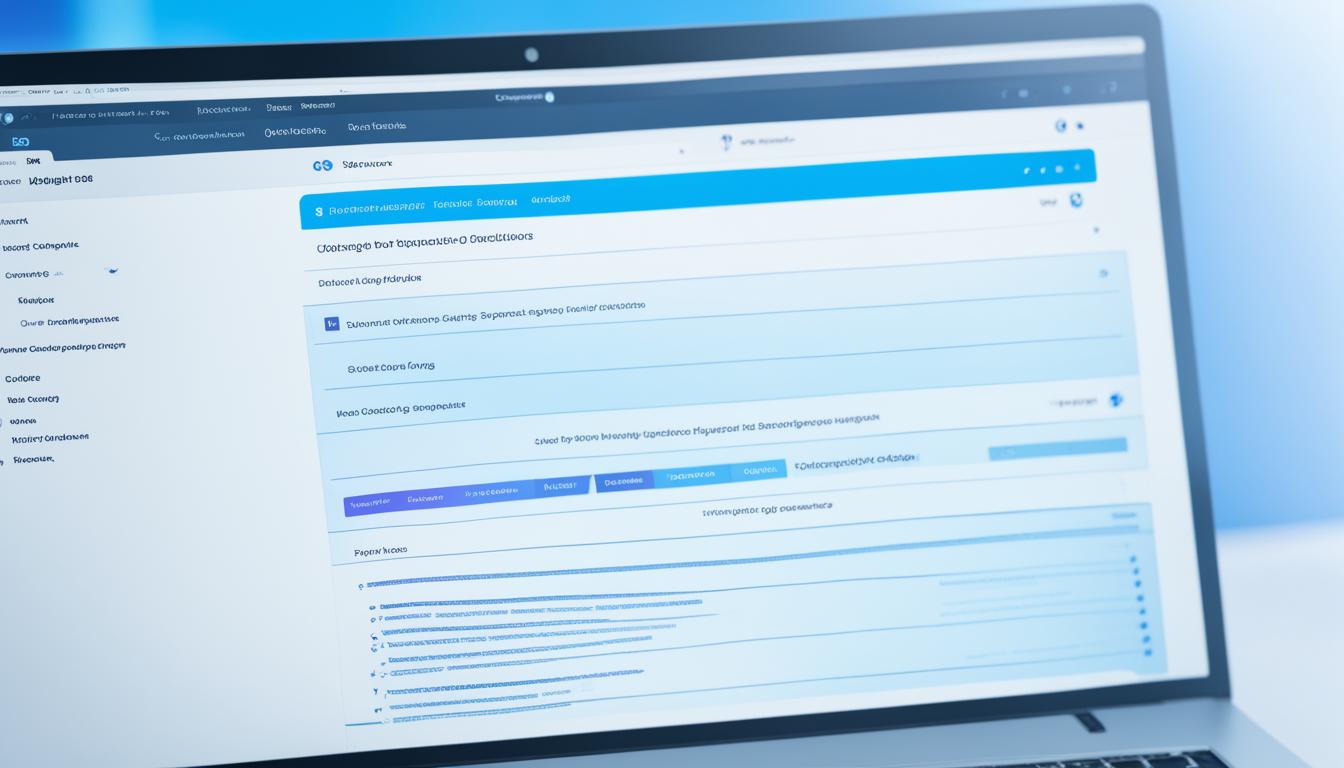How to Tell if a Website is Made With WordPress
Did you know that over 35% of all websites on the internet are built with WordPress? That’s an astonishing number considering the vastness of the online world. With such prevalence, it’s no wonder that many website owners and developers are eager to identify WordPress sites. But how can you easily detect if a website is made with WordPress? In this article, I will share some effective methods to help you identify and distinguish WordPress websites.
Key Takeaways:
- Checking for “Powered by WordPress” credits or searching for “WordPress” or “wp-content” in the source code can indicate a website built with WordPress.
- Online tools like BuiltWith and Is It WordPress? provide quick and accurate results in identifying WordPress sites.
- Browser extensions like Library Sniff (Chrome) and BuiltWith Add-on (Firefox) can simplify the process of detecting WordPress websites.
- Identifying WordPress sites can be valuable for design inspiration and analyzing website functionality.
- While not foolproof, combining multiple techniques can generally help determine if a website is made with WordPress.
Checking the Source Code
When it comes to determining whether a website is built with WordPress, examining the source code can provide valuable insights. By reviewing the WordPress source code, you can look for specific indications that point to the use of WordPress.
A key element to consider is the presence of important files being loaded from the “/wp-content/” folder. This folder is commonly used by WordPress websites to store media files such as images, videos, and audio. Therefore, if you spot references to the wp-content folder in the source code, it’s a strong indication that the website is built with WordPress.
Another effective method is to search for the term “WordPress” in the source code. By doing so, you can quickly identify whether the website’s code includes any mentions of WordPress. This simple search can provide concrete evidence of a WordPress website.
In addition to searching for the term “WordPress,” keep an eye out for the generator tag. This tag often appears in the source code and indicates the specific version of WordPress being used.
The term “wp-content” appearing in the source code is also a strong indicator of a WordPress website. As mentioned earlier, this folder is primarily associated with WordPress and is unlikely to be found in the source code of websites using other content management systems.
Examining the source code for these specific indications can help you confidently determine whether a website is built with WordPress or not.
| Method | Indicator |
|---|---|
| 1. Look for files loaded from the “/wp-content/” folder | Reference to the wp-content folder in the source code |
| 2. Search for the term “WordPress” in the source code | Presence of the term “WordPress” in the source code |
| 3. Check for the generator tag | Indication of the WordPress version being used |
| 4. Look for the term “wp-content” in the source code | Mention of the “wp-content” folder in the source code |
Using Online Tools
If you’re looking for a quick and easy way to determine if a website is built with WordPress, online tools can be a great resource. Two popular options for analyzing website technology are BuiltWith and Is It WordPress?.
BuiltWith offers comprehensive information about the technology used on a website, including the Content Management System (CMS). By simply entering the URL of the website you’re interested in, BuiltWith will provide a detailed report on the website’s technology stack. It will identify if the website is using WordPress as its CMS and even reveal the specific version of WordPress that is installed.
If you prefer a more straightforward answer, Is It WordPress? is the tool for you. With Is It WordPress?, you can determine if a website is built with WordPress with a simple “yes” or “no” response. This tool is perfect for those who want a quick and accurate assessment of the technology behind a website.
Both BuiltWith and Is It WordPress? are free to use and can provide immediate results. Whether you’re a web developer or simply curious about the technology behind a website, these online tools are essential for identifying if a website is built with WordPress.
Benefits of Using Online Tools:
- Quickly determine if a website is built with WordPress
- Access comprehensive information about the website’s technology stack
- Identify the specific version of WordPress installed
- Obtain a simple “yes” or “no” answer for WordPress detection
- Free and easy to use
With these online tools at your disposal, you can analyze website technology efficiently and accurately. Say goodbye to manual source code inspections and let these tools do the work for you.

| Online Tool | Features |
|---|---|
| BuiltWith | Comprehensive analysis of website technology |
| Is It WordPress? | Simple “yes” or “no” response for WordPress detection |
Browser Extensions for WordPress Detection
Identifying WordPress websites can be made easier by using browser extensions specifically designed for this task. Two popular extensions for detecting WordPress are Chrome Sniffer and Library Sniff Chrome extension.
Chrome Sniffer: This powerful extension for Google Chrome allows users to detect if a website is built with WordPress. In addition to WordPress detection, Chrome Sniffer can provide information on other technologies utilized by the website, such as Google Analytics and jQuery.
Library Sniff Chrome extension: Just like Chrome Sniffer, this extension is also available for Google Chrome. It not only detects if a website is built with WordPress but also provides valuable insights into other technologies used. By installing this extension, users can quickly identify WordPress sites without the need to manually search through the source code.
If you prefer Mozilla Firefox as your browser of choice, the BuiltWith add-on is an excellent alternative for WordPress detection.
BuiltWith add-on Firefox: This add-on offers similar functionality to the popular online tool BuiltWith, but as a browser extension for Firefox. It allows users to determine the Content Management System (CMS) being used on any webpage they visit, including WordPress. Just like the online tool, the BuiltWith add-on provides a quick and easy way to identify if a website is built with WordPress without the need for manual source code inspection.

| Browser Extension | Features | Compatibility |
|---|---|---|
| Chrome Sniffer | Detects WordPress and other technologies | Google Chrome |
| Library Sniff Chrome extension | Detects WordPress and other technologies | Google Chrome |
| BuiltWith add-on Firefox | Detects WordPress and other technologies | Mozilla Firefox |
Final Thoughts
Identifying whether a website is built with WordPress can be a valuable skill for those working within the platform. It offers the opportunity to analyze the design and functionality of WordPress sites, providing inspiration and practical insights. By determining if a site is built with WordPress, users can also identify the theme being used, allowing for a deeper understanding of the website’s structure and design choices.
It’s important to note that not all methods of identification will work on every WordPress site due to variations in configurations and security measures. However, by combining the techniques discussed in this article, users can generally determine if a website is made with WordPress. The “Powered by WordPress” credits in the footer, searching for terms like “WordPress” or “wp-content” in the source code, and utilizing online tools and browser extensions are all effective ways to identify a WordPress website.
If you have any questions or suggestions regarding WordPress website identification or determining if a site is built with WordPress, I encourage you to leave a comment below. Your input is valuable and will contribute to the collective knowledge of our community.
FAQ
How can I tell if a website is made with WordPress?
What should I look for in the source code to determine if a website is built with WordPress?
Are there any online tools to help identify if a website is built with WordPress?
Are there any browser extensions that can help detect if a website is made with WordPress?
Why is it important to determine if a website is built with WordPress?
- How Strategic SEO Drove Growth for a CPAP E-commerce Brand - July 24, 2025
- Top 3 SEO Companies in Toronto: An Analytical Comparison - July 23, 2025
- SEO for Entry Door Services - April 24, 2025





















Post Comment
You must be logged in to post a comment.